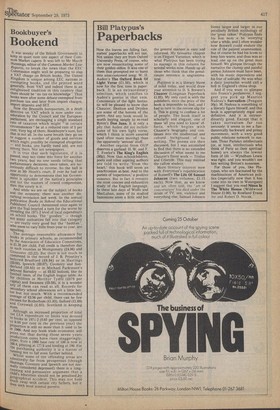Bill Platypus's
Paperbacks
Now the leaves are falling fast, nurses' paperbacks will not last. Not unless they are from Oxford University Press, of course, who are now resuscitating some of their golden oldies. It was one of them that prompted me to burst into unaccustomed song: W. H. Auden's The Oxford Book Of Light Verse (£1.50), which is now for the first time in paperback. It is an extraordinary selection, which testifies to Auden's genius in that vein. Conoisseurs of the light fantastic will be pleased to know that Chaucer, Skelton and Dryden are some of the heroes of the genre. And any book would be worth buying simply to re-read Byron's Don Juan. It is only a pity that Auden did not include some of his own light verse, which I think is more assured (and often more moving) than the apparently 'serious' stuff.
Another reprint from OUP deserves a garland: H. W. and F. T. Fowler's The King's English (80p). Now that schoolchildren, poets and other aspiring authors are told to write 'from the heart,' this book will seem an anachronism at. best. And to the purists of 'experience,' a positive nuisance. But in fact it remains the most concise and exhaustive study of the English language. In these late days of Wolfe and MacLuhan, some of its studied Saxonisms seem a little odd but the general manner is easy and informed. My favourite chapter is on Elegant Variation, which is what Platypus has been trying to manage in this column for several weeks now. Hands up all those who think that the penultimate sentence is ungrammatical.
Platypus is in a literary frame of mind today, and would draw your attention to D. S. Brewer's Chaucer (Longman Paperback £1.95). My only cavil is with the publishers, since the price of the book is impossible to find, and I had to turn to the review slip for it. This is going to confuse a lot of people. The book itself is scholarly and elegant, one of these 'all you need to know' efforts, which begins with Chaucer's biography and continues into the intellectual and cultural background of his writing. The poems are then discussed, but I was astonished to find that there is no extended discussion of what seems to me Chaucer's finest work — Troilus and Criseyde. This may mislead the callow student,
More literary interest now with Everyman's republication of Boswell's The Life Of Samuel Johnson (two volumes, £1.15 each). Now that, as we know and are often told, the 'art of conversation' has died under the strain of TV, sex, violence and everything else, Samuel Johnson
looms larger and larger in our peculiarly British mythology of the 'great talker.' Platypus finds his bon mots a bit wearying after a while, and I often wonder how Boswell could endure the role of the patient anameuensis. But of course he had his loves to keep him warm, and thus was at least one up on the great man himself. We glimpse through the narrative the clumsy and painful person Johnson must have been, with his manic depressions and his fear of solitude, lie was what a daily journalist would call a bull in England's china shop.
And if you want to glimpse into France's parfumerie, I suggest you pick up Maurice Nadeau's Surrealism (Penguin 50p). M. Nadeau is something of a literary figure himself, and this book is appropriately regal and definitive. And it is extraor. dinarily good. Except that it takes surrealism .far too seriously: it seems to me a fundamentally backward and prissy movement, with a very good public relations network to sustain. These Parisian intellectuals (or, at least, intellectuals who think of Paris as their spiritual home) are always the lowest form of life — Wyndham Lewis was right, and you wouldn't see him writing Breton's nonsense.
For those of you, like Platypus, who are fascinated by the machinations of American politics (especially now that it has come into its own in Watergate) I suggest that you read Nixon In The White House (Wildwood House £1.00), by Rowland Eyans Jnr and Robert D. Novak.










































 Previous page
Previous page